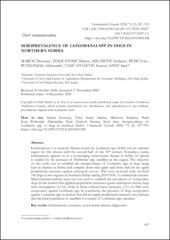Seroprevalence of Leishmania spp. in dogs in Northern Serbia

View/
Date
2020Author
Marčić, Doroteja
Žekić Stošić, Marina
Milošević, Smiljana
Pušić, Ivan
Potkonjak, Aleksandar
Tasić-Otašević, Suzana
Savić, Sara
Metadata
Show full item recordAbstract
Leishmaniosis is a zoonotic disease caused by Leishmania spp. Serbia was an endemic
region for this disease until the second half of the 20th century. Nowadays, canine
leishmaniosis appears to be a re-emerging vector-borne disease in Serbia. Its spread
is enabled by the presence of Phlebotomus spp. sandflies in this region. The objective
of this study was to establish the seroprevalence of Leishmania spp. in dogs being
kept in shelters in Serbia and compare those that apply and those that do not apply
prophylactic measures against arthropod vectors. This cross-sectional study involved
336 dogs in two regions in Northern Serbia during 2019-2020. A commercial enzymelinked
immunosorbent assay test was used to establish the prevalence of seropositive
dogs. In the shelters that applied prophylactic measures against arthropod vectors, dogs
were seronegative (n=52), while in those without these measures, 2.1% (6/284) were
seropositive against Leishmania spp. In conclusion, the presence of dogs seropositive
against Leishmania spp. in shelters that did not apply prophylactic measures may indicate
that the local population of sandflies is a source of Leishmania spp. parasites.
